The article titled "10 Trends Shaping the Food and Beverage Sector in the Hospitality Industry" delves into the evolving trends that are significantly influencing the food and beverage landscape within hospitality. It underscores critical shifts such as:
These elements are essential for businesses aiming to enhance customer satisfaction and adapt to the ever-changing consumer preferences. By recognizing these trends, hospitality professionals can position themselves strategically in a competitive market.
The food and beverage sector within the hospitality industry is undergoing a profound transformation, driven by evolving consumer preferences and innovative practices. As establishments strive to enhance guest experiences and optimize operational efficiency, trends such as sustainability, personalized nutrition, and digital transformation are taking center stage.
However, amidst these promising developments, how can hospitality businesses effectively navigate the complexities of these trends to not only meet but exceed customer expectations? This article delves into ten key trends shaping the industry, offering insights that can empower businesses to thrive in a competitive landscape.
Lights On is revolutionizing revenue management in the hospitality sector by harnessing the power of data analytics to refine pricing strategies and enhance occupancy rates. This innovative approach enables clients to adeptly navigate market fluctuations, ensuring that hotels and restaurants can fully capitalize on their revenue potential. By focusing on key performance indicators and examining market patterns, Lights On provides businesses with the insights essential for making informed decisions that lead to financial success. Furthermore, this data-driven methodology not only optimizes pricing but also enhances overall operational efficiency, allowing establishments to respond swiftly to changing market dynamics.
To further enhance bookings, hotel owners can implement such as:
As the industry increasingly recognizes the value of sophisticated revenue management practices, Lights On stands out as a leader, committed to empowering clients through innovative strategies and actionable insights. With the goal for hotels to achieve more than 50% direct bookings by 2030, the importance of leveraging data analytics in revenue management has never been clearer.
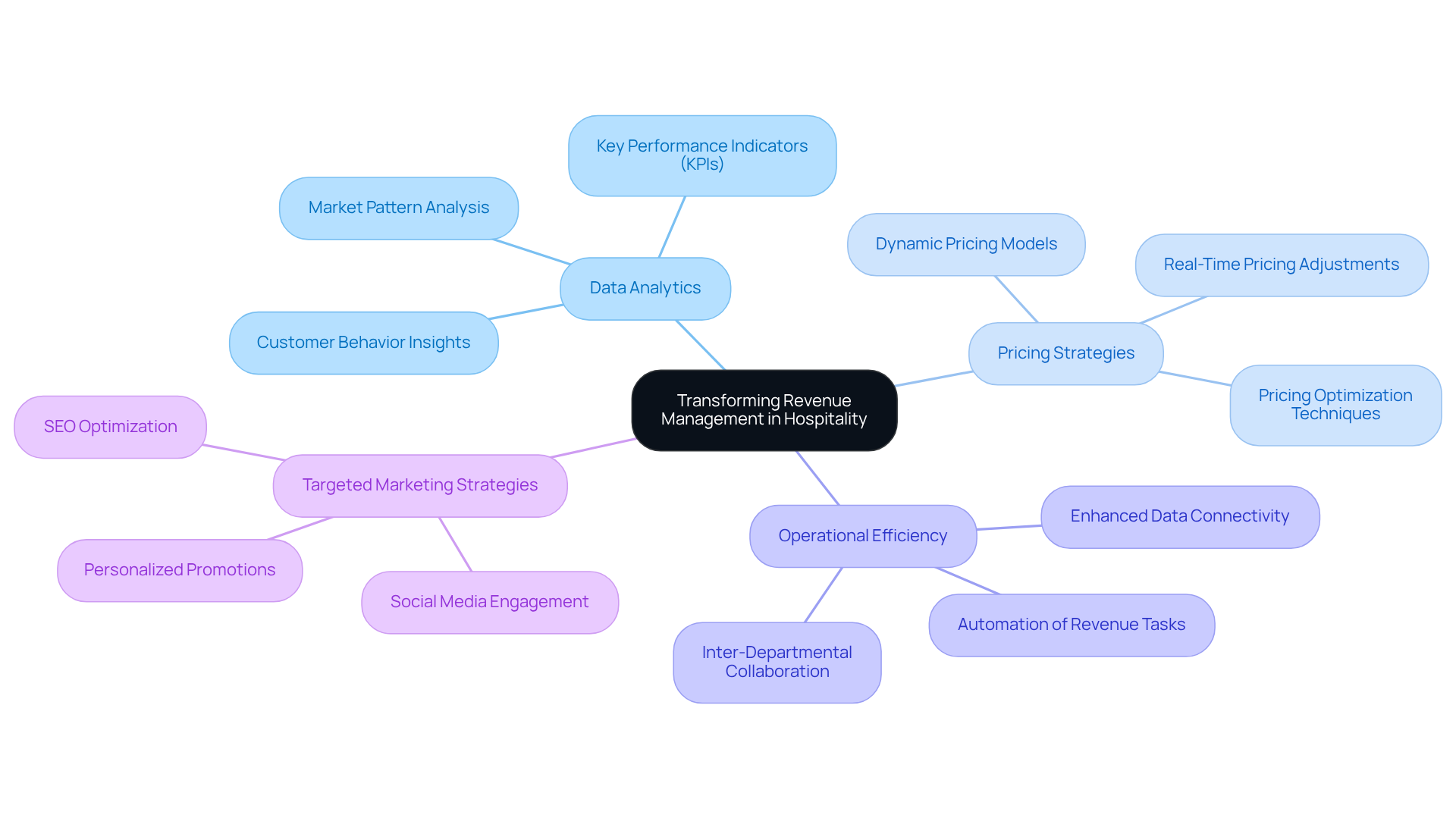
Sustainability stands as a pivotal movement reshaping the food and beverage industry, as consumers increasingly gravitate towards establishments that prioritize eco-friendly practices. This transformation encompasses:
By embracing these initiatives, hospitality businesses not only contribute to environmental conservation but also enhance their appeal in the food and beverage sector in the hospitality industry to a burgeoning demographic of eco-conscious diners.
The shift towards sustainability transcends mere trend; it is evolving into a standard expectation among guests. Hotels and restaurants that implement responsible practices, such as utilizing locally grown and organic ingredients, are observing a positive impact on their revenue. For instance, establishments focusing on regenerative agriculture and local sourcing are not only reducing transportation emissions but also fostering stronger community ties, which can lead to heightened customer loyalty and repeat business.
Successful sustainability initiatives are evident throughout the industry. Numerous hotels are opting to renovate or donate furniture and linens during upgrades rather than discarding them, while restaurants are progressively adopting digital ordering systems that enhance customized dining experiences. These practices not only mitigate waste but also resonate with consumers who are more inclined to support businesses that align with their values. According to the National Restaurant Association's 2025 Culinary Forecast, sustainability and local sourcing are increasingly prominent in menu patterns within the food and beverage sector in the hospitality industry, reflecting a significant shift in consumer preferences towards eco-friendly meal choices. Oliver Truesdale-Jutras, Chairman of Singapore's F&B Sustainability Council, underscores that chefs should design menus that showcase local ingredients and culture, moving away from standardized global offerings, further emphasizing the critical role of local sourcing in culinary practices.
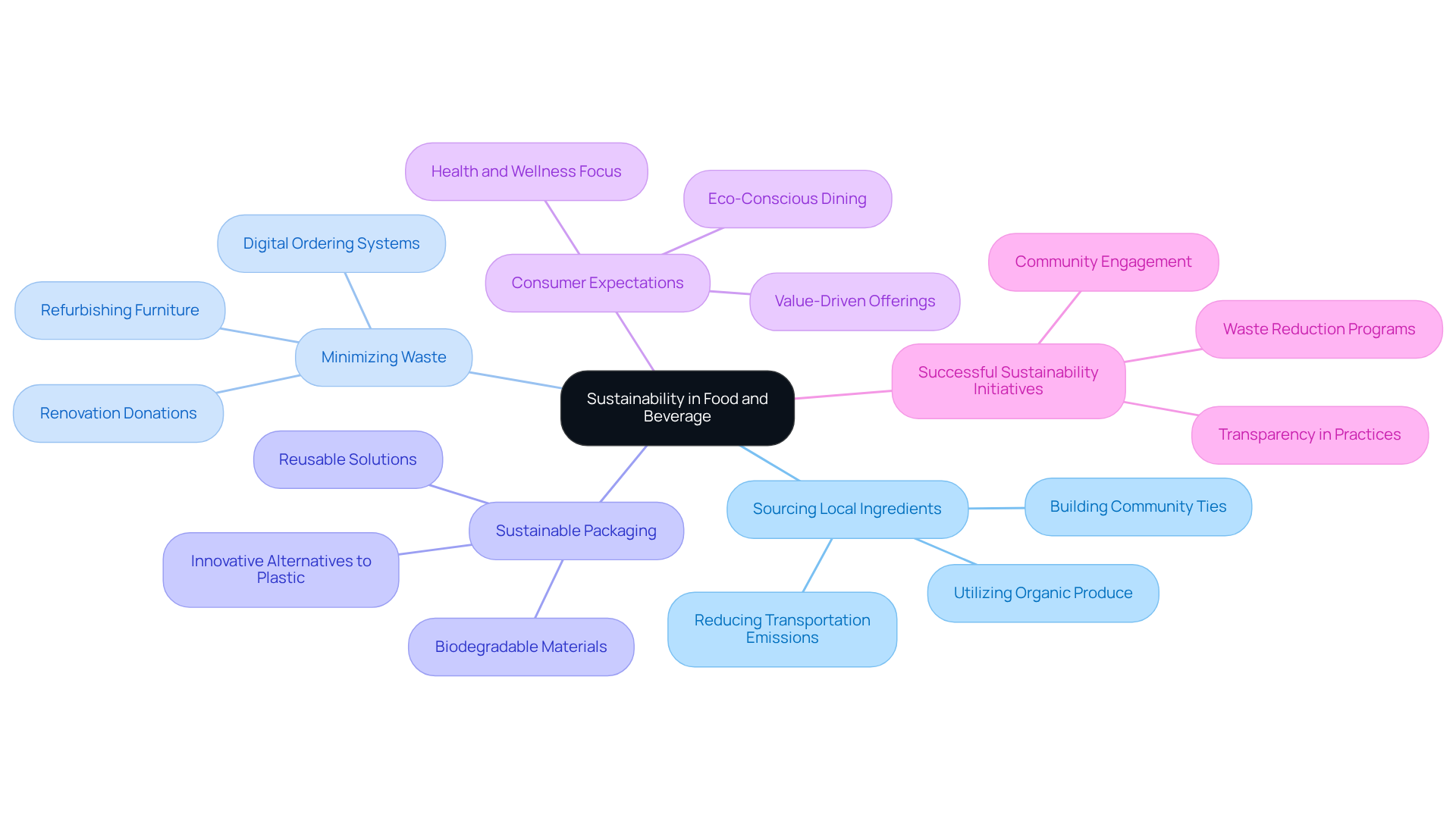
Functional foods, which offer health benefits that extend beyond basic nutrition, are gaining significant traction among consumers. The global functional foods market was valued at USD 280.7 billion in 2021 and is projected to experience a compound annual growth rate of 8.5%, reaching USD 586.1 billion by 2030.
Hospitality businesses have a unique opportunity to capitalize on this trend within the food and beverage sector in the hospitality industry by incorporating menu items rich in probiotics, antioxidants, and other beneficial ingredients. This approach not only addresses the needs of health-conscious patrons but also positions venues as leaders in the food and beverage sector in the hospitality industry through their focus on .
For instance, establishments like Shizen Vegan Sushi Bar and PLNT Burger have successfully attracted customers with their innovative plant-based offerings, demonstrating how health-focused menu items can enhance customer satisfaction and loyalty.
As we approach 2025, the emphasis on functional foods is anticipated to intensify, with 64% of U.S. adults expressing a preference for foods devoid of artificial ingredients. By embracing these trends, businesses in the food and beverage sector in the hospitality industry can not only elevate their appeal but also drive profitability in an increasingly competitive market.
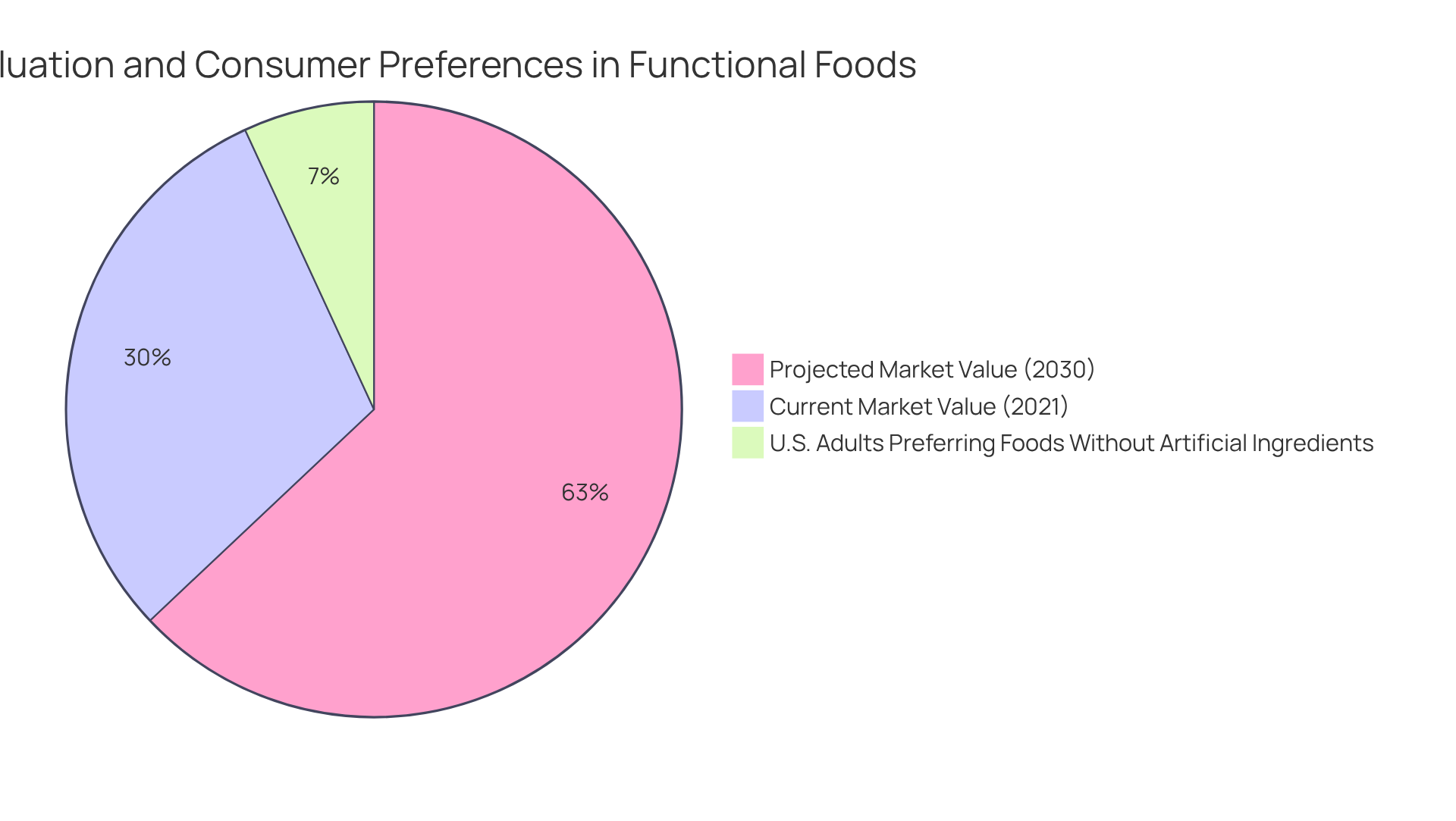
Tailored nutrition is increasingly significant as visitors seek meals that cater to their specific dietary requirements and preferences. By providing customizable menu options—such as gluten-free, vegan, or low-carb dishes—hospitality businesses can greatly enhance guest satisfaction and foster loyalty. Notably, 60% of consumers are willing to pay more for locally sourced ingredients, underscoring the demand for personalized culinary options that emphasize health and sustainability. Furthermore, 72% of clients indicate that a tailored meal increases their likelihood of returning, highlighting the direct impact of personalization on customer loyalty.
Utilizing technology to not only streamlines the customization process but also ensures a memorable dining experience. As the food and beverage sector in the hospitality industry evolves, the successful customization of restaurant menus to meet dietary needs will be essential in fulfilling the expectations of modern diners. Additionally, studies reveal that patrons become 27% more valuable when an emotional connection is established with a restaurant, further accentuating the importance of personalized meal interactions.
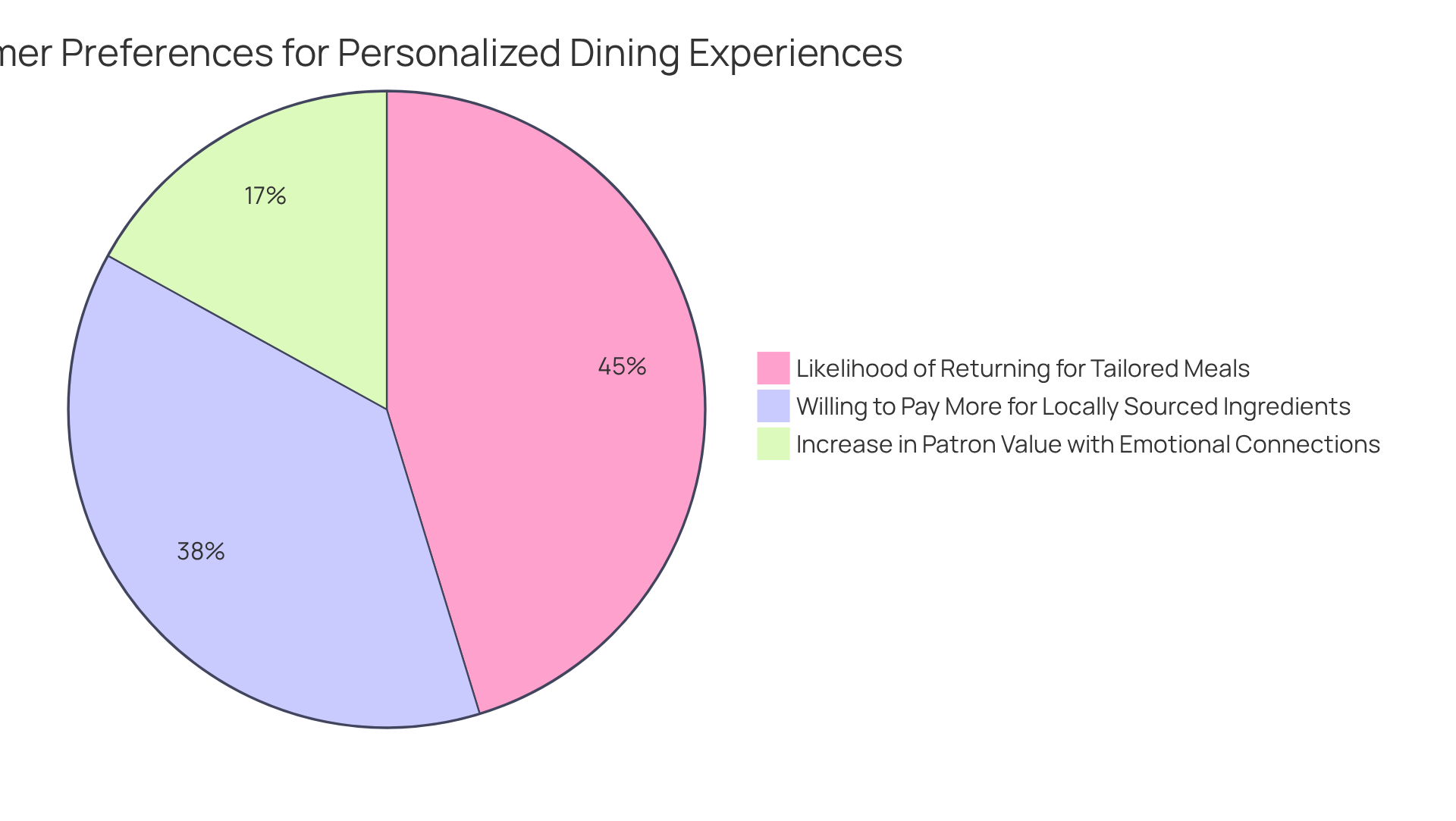
Digital transformation is revolutionizing , significantly enhancing visitor engagement through innovative technology solutions. Mobile ordering systems, for example, streamline the dining experience, enabling patrons to place orders directly from their devices. This not only boosts convenience but also elevates operational efficiency. Customized marketing initiatives leverage data analysis to tailor offers and communications, cultivating a stronger bond with customers and enhancing loyalty.
To effectively boost reservations, hotel proprietors should consider implementing targeted marketing tactics that utilize visitor information to create personalized experiences. For instance, offering unique promotions to returning patrons based on their previous stays can reinforce loyalty and encourage repeat visits. Furthermore, the integration of user-friendly systems for bookings and feedback is essential, as they facilitate smooth interactions and provide valuable insights into visitor preferences.
As we approach 2025, the integration of advanced technologies like AI and 5G will further enhance visitor experiences. AI-driven systems can analyze visitor data to deliver hyper-personalized services, while 5G connectivity will enable real-time interactions, such as instant service requests and smart room controls. Successful implementations of these technologies are already being observed in leading hotels, where improved networking infrastructure supports innovative services that delight visitors.
The emphasis on digital transformation transcends merely adopting new tools; it is about cultivating a culture of adaptability and responsiveness to client needs. As highlighted by industry leaders, the capacity to embrace change and leverage technology effectively will be pivotal for hospitality businesses aspiring to thrive in a competitive landscape. The future of visitor interaction in hotels and restaurants is promising, driven by a commitment to innovation and an emphasis on delivering exceptional experiences. By aligning technology with effective marketing strategies, hotels can significantly enhance their bookings and overall guest satisfaction.
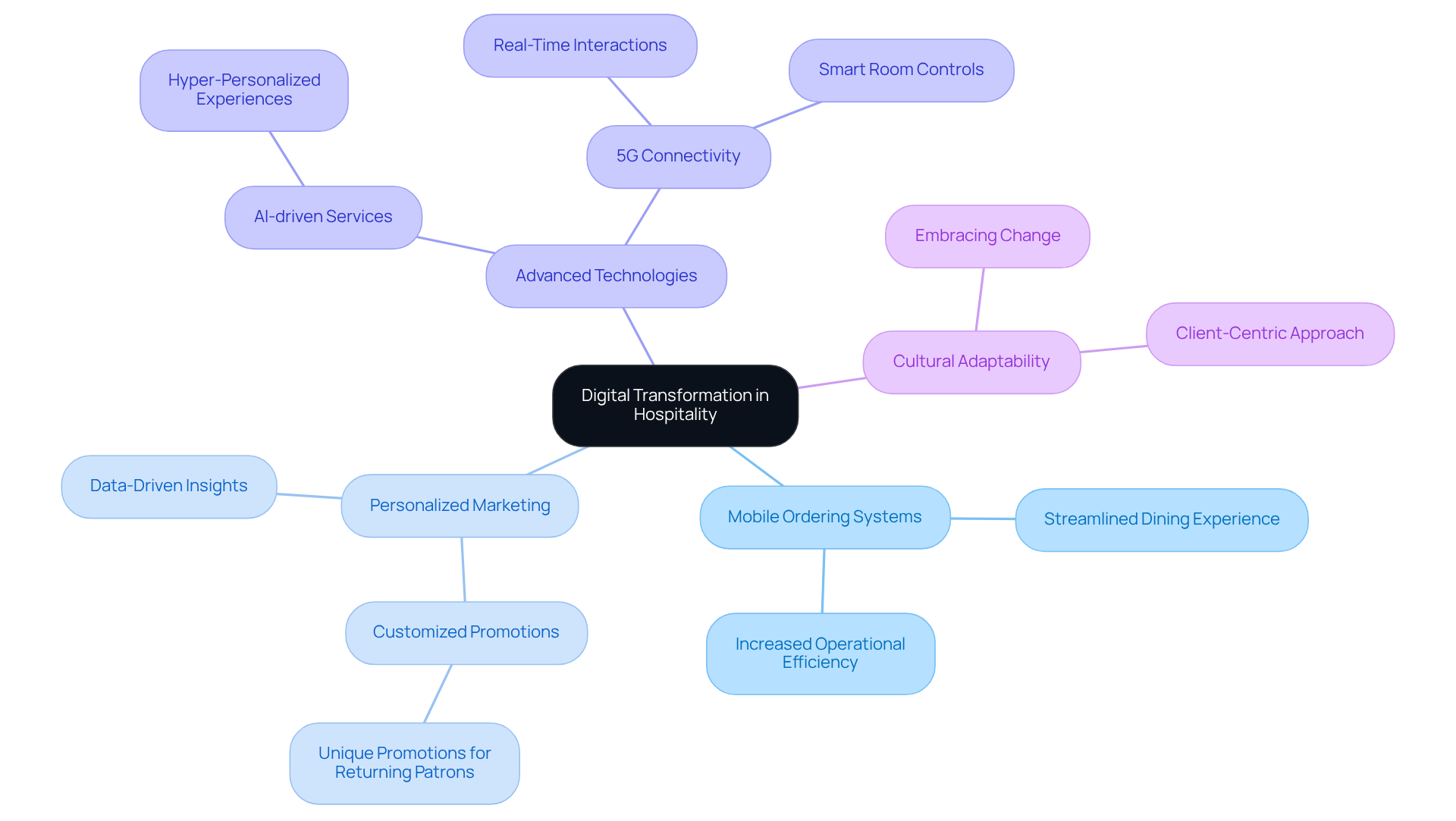
The integration of novel flavors and alternative ingredients is revolutionizing the food and beverage sector, empowering hospitality businesses to craft innovative dishes that captivate diners. By embracing unique spices, plant-based proteins, and exotic fruits, establishments can elevate their menus and create memorable dining experiences. This movement not only boosts customer satisfaction but also positions restaurants as pioneers in .
Chefs are increasingly experimenting with unexpected flavor combinations, such as:
These combinations appeal to both adventurous palates and health-conscious consumers. As the demand for creativity in food intensifies—especially among Gen Z, who prioritize unique culinary experiences—restaurants that focus on these innovative ingredients are poised to thrive.
Furthermore, the rise of functional wellness ingredients, such as adaptogens and botanicals, reflects a broader consumer interest in health and sustainability, compelling establishments to rethink their offerings. The growing popularity of bold and smoky flavors adds depth and complexity to dishes. By leveraging these trends, hospitality companies can not only meet evolving consumer preferences but also differentiate themselves in a competitive market.
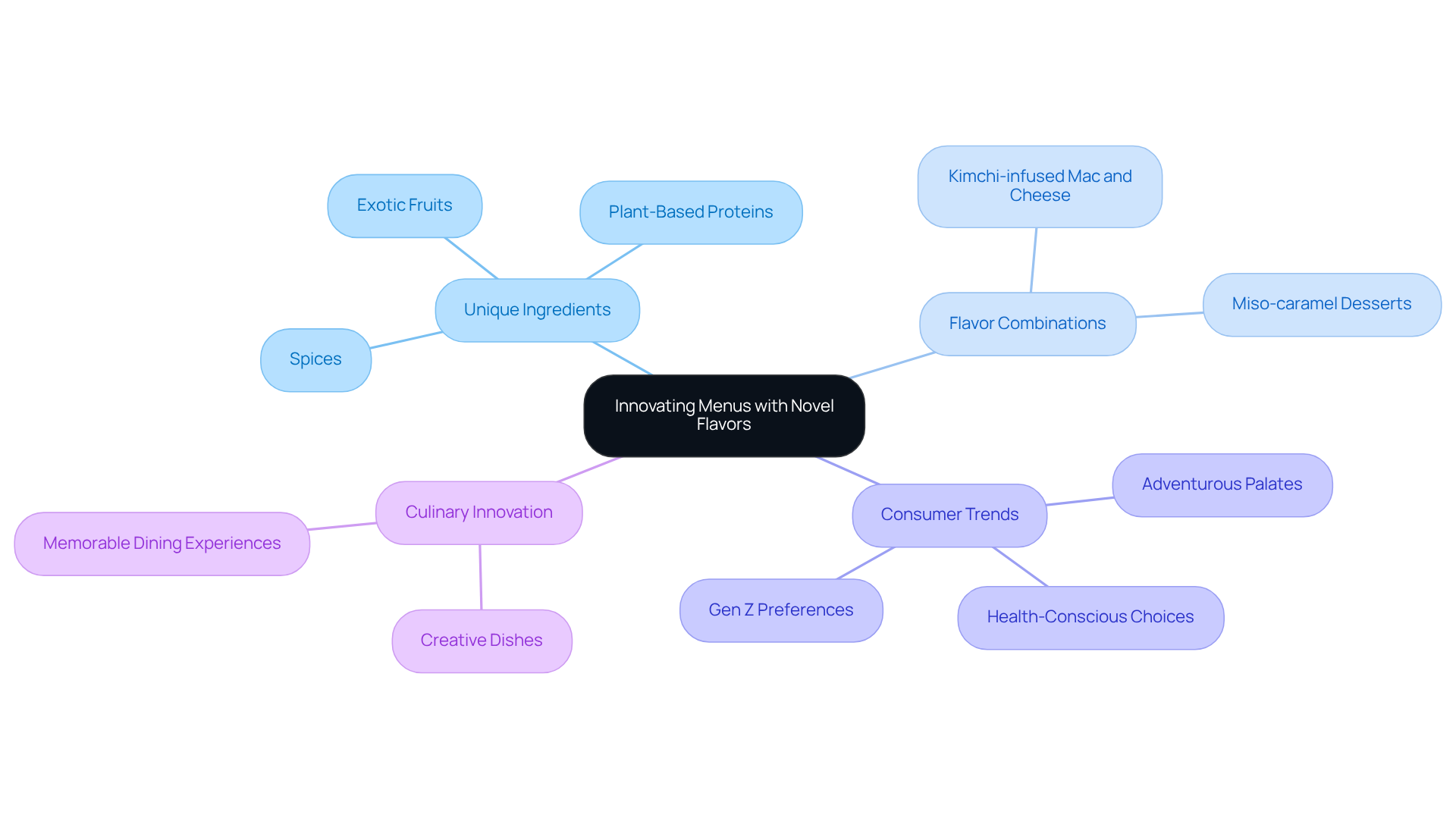
Transparency in has emerged as a pivotal factor for consumers when selecting dining establishments. Hospitality businesses that proactively share information about their suppliers and sourcing practices can cultivate trust and loyalty among their guests. By showcasing local farms and sustainable practices, these establishments not only enhance their brand image but also attract conscientious diners who prioritize ethical choices. Furthermore, this approach can lead to increased customer retention and positive word-of-mouth, ultimately driving revenue growth.
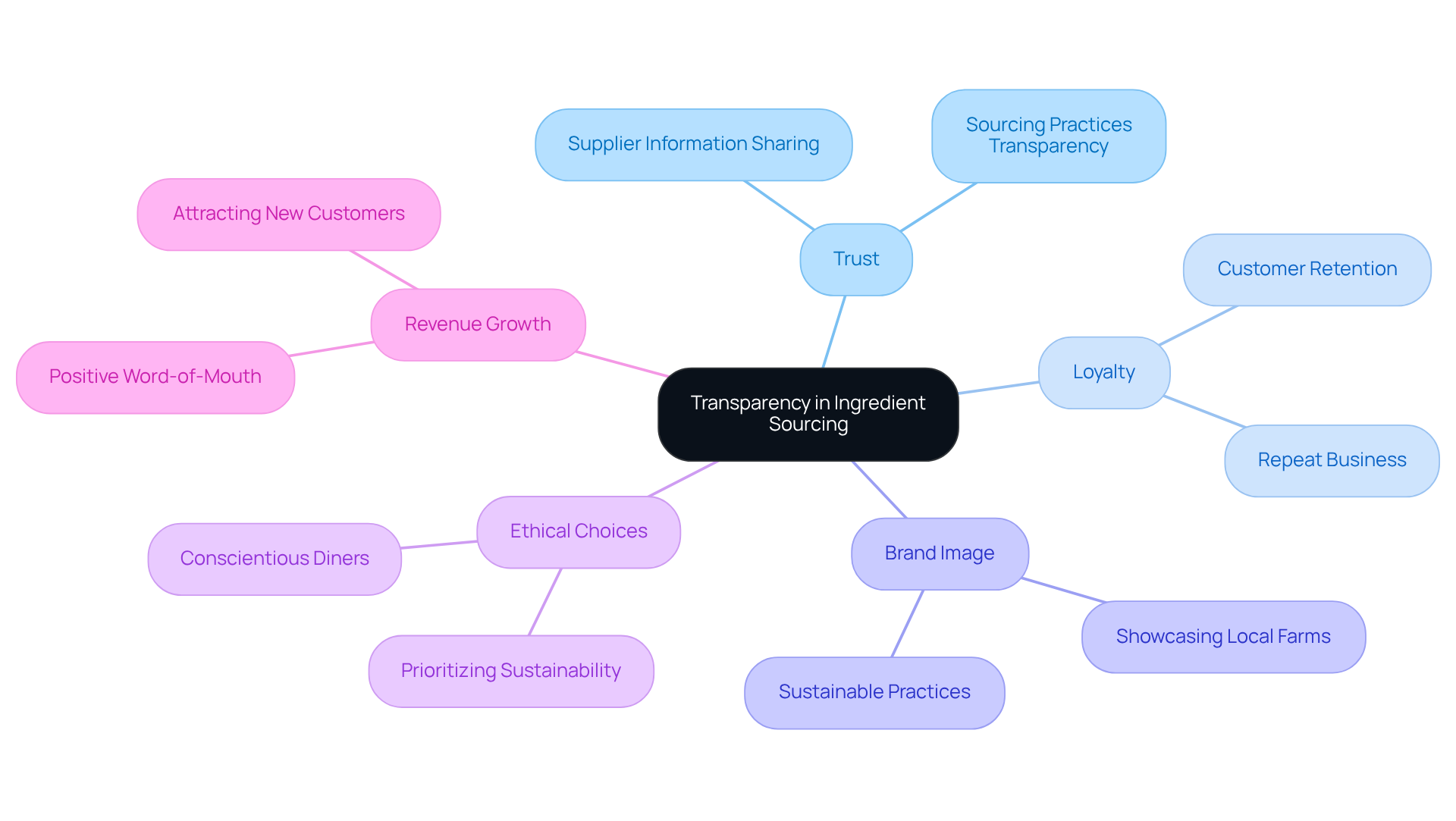
The trend of promoting wellness through mindful eating is gaining significant traction within the food and beverage sector in the hospitality industry. Restaurants are increasingly designing menus that prioritize nutritional value, balance, and portion control, catering to the growing demand from health-conscious consumers.
According to forecasts, the personalized nutrition industry is anticipated to reach $23.3 billion by 2027, underscoring the considerable transition towards wellness-focused meals. By integrating educational components such as comprehensive nutritional details and practical mindful eating advice, establishments can greatly enhance meal enjoyment. This approach not only encourages healthier choices but also fosters a deeper connection between diners and their meals.
As consumers become more discerning about their food choices, the impact of mindful eating practices is evident, influencing preferences and driving demand for dishes that align with their wellness goals. Nutrition specialists emphasize that concentrating on wellness eating patterns is crucial for restaurants in the food and beverage sector in the hospitality industry, as they look to satisfy evolving consumer demands and cultivate a culture of health and well-being.
As noted by Emlyn Brown, 'As life extends, so does the quest for a sharper mind—wellness now means nurturing the brain as much as the body.' This insight highlights the importance of into culinary experiences.
Furthermore, establishments like Hotel Wailea have successfully implemented these strategies, resulting in improved brand visibility and revenue, showcasing the tangible benefits of mindful eating practices.
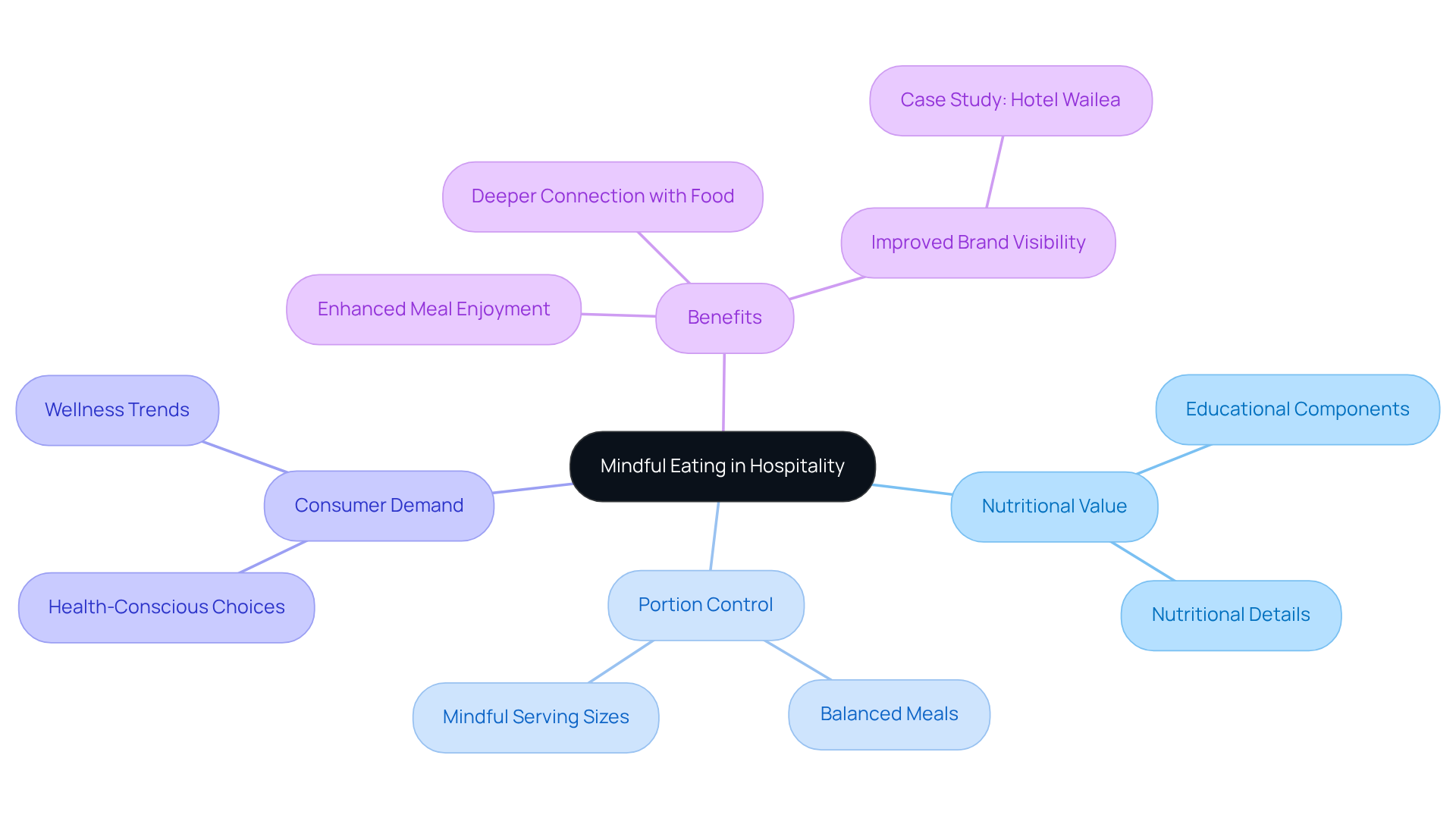
Conducting comprehensive market pattern analysis is vital for hospitality enterprises aiming to adapt to the ever-evolving consumer preferences within the food and beverage sector. With 65% of customers identifying as a key component of their dining experiences, establishments must stay attuned to emerging trends, such as dietary restrictions and flavor preferences. Personalization is increasingly critical in the hospitality industry, as travelers are now more inclined to spend up to 25% more for tailored offerings. This underscores the growing importance of understanding individual visitor needs.
Leveraging advanced data analytics tools can provide valuable insights into consumer behavior, empowering businesses to make informed strategic decisions. As the hospitality market continues to expand, projected to hit $4.9 trillion in 2024 with an annual growth rate of 5.8% from 2022 to 2032, grasping these dynamics will be crucial for success. Industry leaders emphasize that adapting to consumer preferences in the food and beverage sector in the hospitality industry, including the rising demand for multisensory dining experiences and social media-influenced menus, will be essential by 2025. Dr. Philippe Masset notes, "AI is transforming the hospitality industry by merging the operational efficiencies of technology with human interaction to enhance visitor experiences." By embracing these trends, hospitality enterprises can elevate guest satisfaction and drive revenue growth.
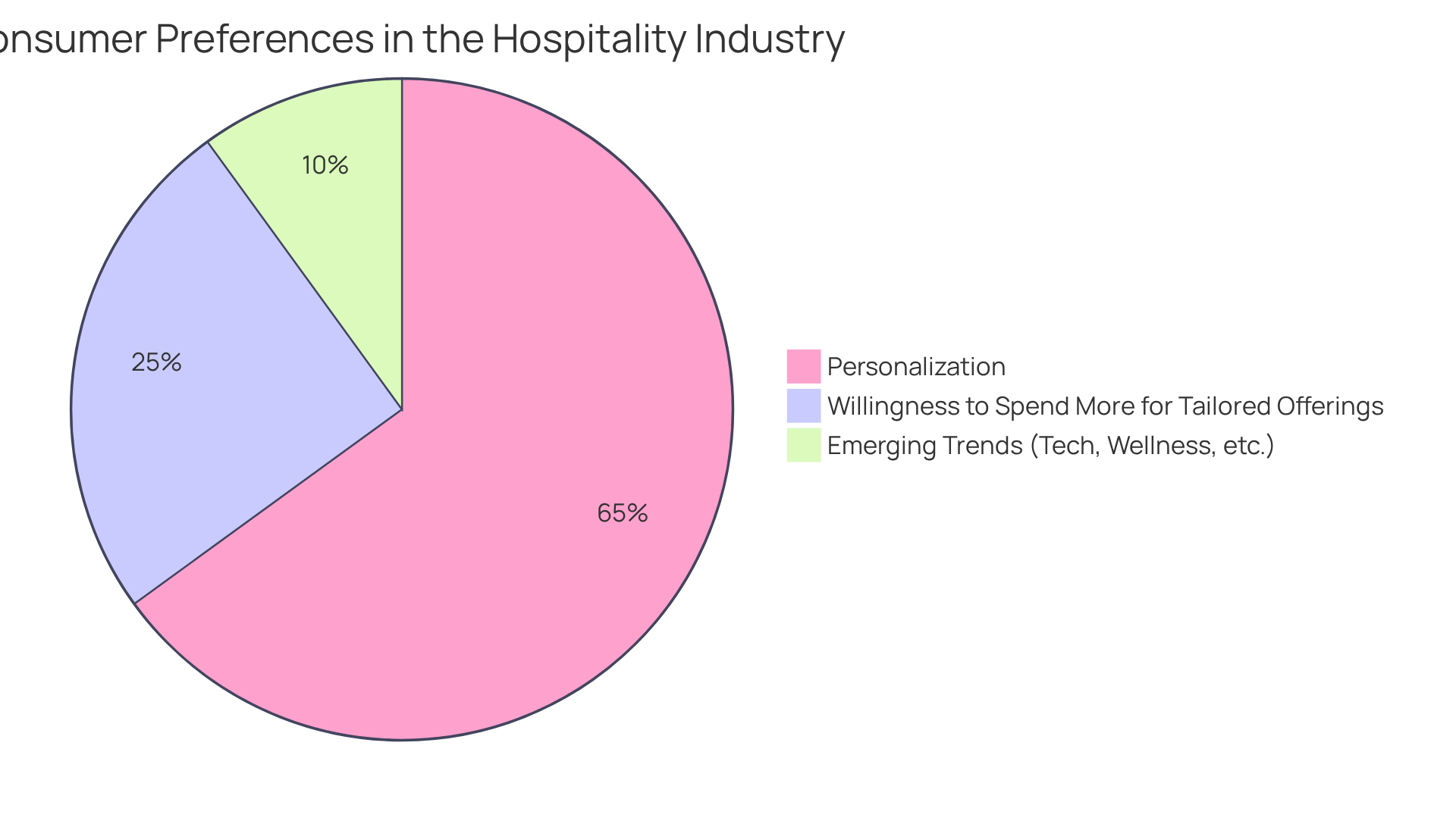
Integrating technology into the food and beverage sector in the hospitality industry is not just beneficial; it is essential for streamlining processes and boosting efficiency. Advanced inventory management systems, for instance, are now utilized by over half of restaurants, enabling them to predict usage trends and automatically track waste. This innovation not only reduces food costs but also enhances operational control, with many establishments reporting an or more within the first year of implementation.
Furthermore, modern point-of-sale (POS) solutions serve as the backbone of restaurant operations, connecting various service aspects and improving reliability. As 52% of corporate restaurants shift to cloud-based POS systems, they encounter faster service and improved customer engagement. Notably, third-party fees can consume 20-30% of each sale when orders are taken through those platforms, making direct online ordering a financially advantageous option.
The combination of mobile ordering and self-service kiosks enables guests to tailor their dining preferences, resulting in heightened satisfaction and loyalty. These technological innovations signal to customers that the establishment is forward-thinking and committed to enhancing their experience. Industry leaders emphasize that the right tools will not only help you operate more efficiently today but also help drive repeat business and prepare your operation for the challenges and opportunities ahead.
Additionally, real-time labor and sales data allow managers to adjust staffing faster, optimizing labor management—a significant aspect of operational efficiency in the food and beverage sector in the hospitality industry. As the restaurant technology market continues to evolve, establishments that embrace these advancements will be better positioned to thrive in a competitive landscape. The restaurant management software market is projected to grow at a strong pace through 2030, underscoring the increasing relevance of technology in the industry.
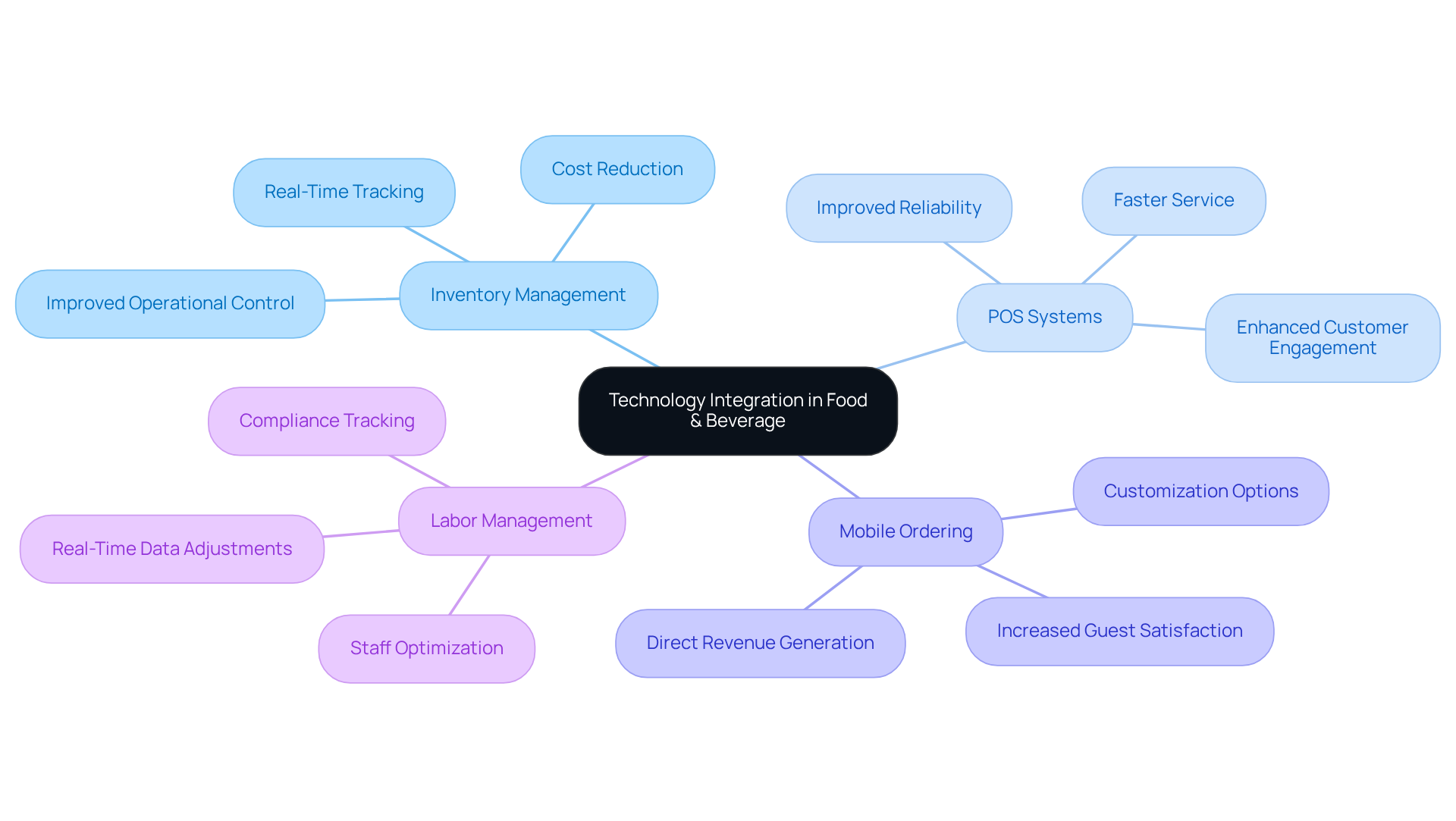
The food and beverage sector within the hospitality industry is experiencing a transformative evolution, driven by key trends that prioritize data-driven decision-making, sustainability, personalized experiences, and technological advancements. Embracing these trends is essential for hospitality businesses aiming to enhance guest satisfaction and drive revenue growth.
Throughout this article, we have explored various trends, including:
Furthermore, the integration of technology in operations and the focus on transparency in ingredient sourcing have emerged as critical factors influencing consumer choices and loyalty. Each of these elements not only responds to current market demands but also positions businesses to thrive in an increasingly competitive landscape.
As the hospitality industry moves forward, it is crucial for establishments to adapt to these evolving consumer preferences. By leveraging innovative strategies and embracing sustainability, personalization, and technology, businesses can create memorable dining experiences that resonate with today’s conscientious diners. The future of hospitality lies in the ability to remain agile and responsive to these trends, ensuring that both guests and businesses flourish in this dynamic environment.
What is Lights On and how does it impact revenue management in hospitality?
Lights On is an innovative approach that transforms revenue management in the hospitality sector by utilizing data analytics to refine pricing strategies and enhance occupancy rates. It helps clients navigate market fluctuations and capitalize on revenue potential through informed decision-making based on key performance indicators and market patterns.
What marketing strategies can hotel owners implement to enhance bookings?
Hotel owners can enhance bookings by implementing targeted marketing strategies such as personalized promotions based on visitor data, leveraging social media for customer engagement, and optimizing their online presence through SEO.
What is the goal for hotels regarding direct bookings by 2030?
The goal for hotels is to achieve more than 50% direct bookings by 2030, highlighting the importance of leveraging data analytics in revenue management.
How is sustainability impacting the food and beverage industry?
Sustainability is reshaping the food and beverage industry as consumers increasingly prefer establishments that prioritize eco-friendly practices, such as sourcing local ingredients, minimizing waste, and adopting sustainable packaging solutions.
What are some examples of sustainable practices in the hospitality sector?
Examples of sustainable practices include renovating or donating furniture and linens during upgrades, adopting digital ordering systems to enhance customized dining experiences, and utilizing locally grown and organic ingredients.
How does the shift towards sustainability affect customer loyalty and revenue?
Implementing responsible practices, such as local sourcing, can positively impact revenue by fostering stronger community ties and enhancing customer loyalty, as eco-conscious diners are more likely to support businesses that align with their values.
What is the projected growth for the global functional foods market?
The global functional foods market was valued at USD 280.7 billion in 2021 and is projected to grow at a compound annual growth rate of 8.5%, reaching USD 586.1 billion by 2030.
How can hospitality businesses cater to health-conscious consumers?
Hospitality businesses can cater to health-conscious consumers by incorporating menu items rich in probiotics, antioxidants, and other beneficial ingredients, positioning themselves as leaders in wellness cuisine.
What is the consumer preference regarding artificial ingredients in food?
As we approach 2025, 64% of U.S. adults express a preference for foods that are devoid of artificial ingredients, indicating a significant trend towards health-focused dining options.
Transform your group booking strategies with Lights On and watch your occupancy soar.